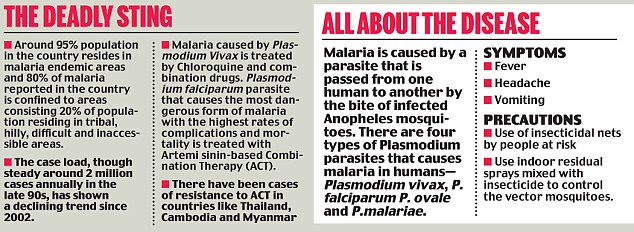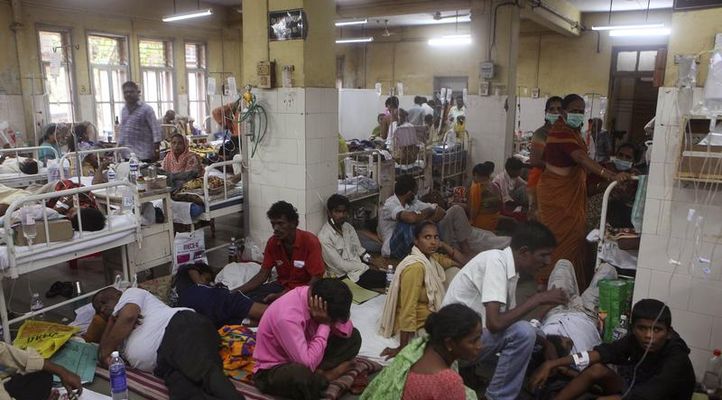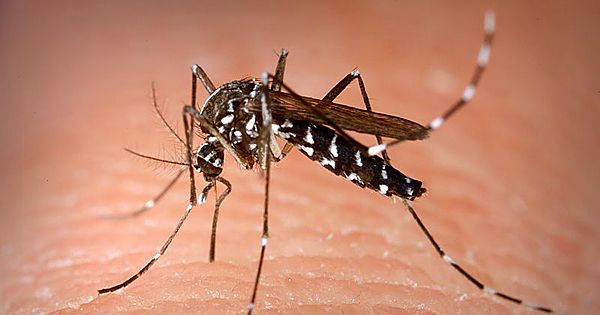What Are Exoplanets And How NASA Detects Life Beyond Our Solar System
Bharti Airtel Set To Acquire Telenor India Within This Year
Google Celebrates NASA’s Discovery Of Seven Earth-Like Planets With An Animated Doodle
Some Home Remedies That Might Sound Bizarre But Actually Work Like A Charm
Akshay Kumar Feels He Has Made Enough Money, Now Wants To Focus On Content & Characters
Delhi ATM Dispenses Fake Rs 2000 Notes From ‘Childrens Bank of India’ With ‘Churan Lable’
Adolf Hitler’s Personal Telephone During World War II Is Up For Auction In The US
From Salman Khan To Rekha, Neil Nitin Mukesh’s Wedding Reception Was Quite A Starry Affair
New Deadly Strain Of Malaria Has Entered India. And It May Be Resistant To Indian Drugs
There is a new deadly disease we have to worry about. As if swine flu, ebola and dengue were not enough, now there is a mutant strain of malaria that has entered India. The unnerving part is that the antimalarial drugs available in India, don't stand a chance against this vector-borne disease, like in Myanmar and Cambodia. In the first research report on drug-resistant malaria from India, scientists of the National Institute of Malaria Research (NIMR) have found a mutation in the disease-causing parasite. "Of the 384 samples we sequenced, non-synonymous mutations in the propeller region were found in four patients from the northeastern states. Though their presence did not correlate with ACT treatment failures, this mutation in the parasite comes as a major threat to India. The mutation has been witnessed in India for the first time. In near future, the resistance to drugs may occur in Indian patients too," NIMR research scientist Dr Vas Dev said.
The Plasmodium falciparum (Pf) parasite – which causes the most dangerous form of malaria with the highest rates of complications and mortality — is treated with Artemisinin-based Combination Therapy (ACT).
The new strain of malaria seems to be resistant to the ACT. This has been noticed around several States in Asia, therefore putting India at great risk.
"Genome association studies have strongly linked a locus on P. falciparum chromosome 13 to artemisinin resistance, and recent mutations in the kelch-13 propeller region (pfk-13) are strongly linked to resistance. To date, this information was not known in Indian samples," Dr Dev added.
Concerned by the new information, the Union Health Ministry is keeping a close eye on the situation.
"Though the mutation has not yet shown any drug resistance in India, it certainly is a major threat. Not only India but the entire world is under threat. Our scientists are carrying out various studies in this regard," said Dr A.C. Dhariwal, National Vector-Borne Disease Control.
This is not the first time the disease has become resistant to the medicine designed to fight it. In the 1970's resistance to traditional anti-malarial drugs like chloroquine emerged in south east Asia, and spread from Burma to India to Africa.
A new class of drugs, artemisinins, came to partial rescue of the patients but resistance to artemisinins first appeared in Cambodia in 2007 and then reached south Burma.
Source: Daily Mail

"Further phenotyping and genotyping studies are required to assess the status of artemisinin resistance in the region where we found the mutation," Dr Dev said.
The government is currently carrying out a number of efficacy studies. "Based on the efficacy studies, we keep changing the drug combinations. To combat the drug resistance in malaria, we recommend the use of combination therapy, i.e. Artesunate plus sulfadoxine pyrimethamine for treatment of P. falcipuram cases in chloroquine resistant areas, surrounding cluster of blocks and 117 high-endemic districts of the northeast, besides Andhra Pradesh, Chhattisgarh, Jharkhand, Madhya Pradesh and Odisha," Dr Dhariwal said.
Malaria is a public health problem in India. 95 percent of Indians live in malaria-endemic areas, and 80 per cent of total malaria cases reported in the country are confined to areas comprising 20 per cent of the population in tribal, hilly, difficult and inaccessible areas.
However, there has been a declining trend in India from 2 million reported cases in 2002.
To date this year, 1,29,852 malaria cases have been reported with 30 deaths; 2014 witnessed 10,70,513 cases with 535 deaths; and in 2013 the number of cases was 8,81,730 with 440 deaths.
Government officials have said the resistance of Plasmodium falciparum to chloroquine were observed to be very high in the studies conducted since 2001. Therefore ACT is being used as the first line of defence against all Pf cases in India.
"For strengthening surveillance, Rapid Diagnostic Test (RDT) for diagnosis of P. falciparum malaria was introduced in high endemic areas and its operation is being scaled up," government officials added.
Source: notiminuto.com






